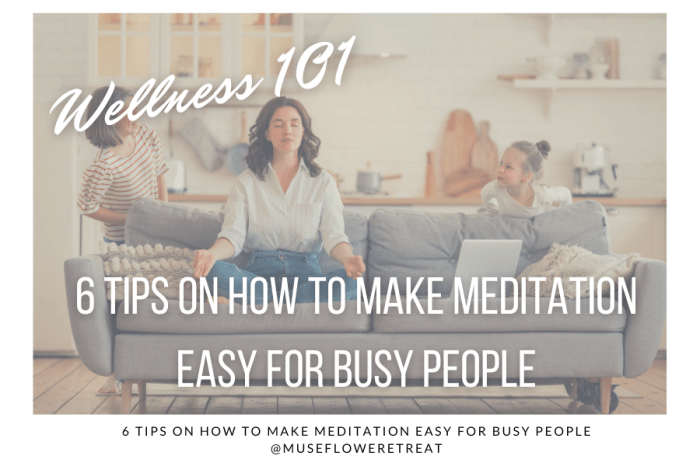7 Tips for Meditating with a Busy Mind takes center stage, beckoning readers into a world of mindfulness crafted with expertise and insight. Dive into this guide for practical strategies to enhance your meditation practice amidst the busyness of life.
Introduction to Meditating with a Busy Mind
When we talk about meditating with a busy mind, we refer to the practice of mindfulness and relaxation even when our thoughts are racing and distractions are abundant. It involves finding inner peace and focus amidst the chaos of everyday life.
It is important to address this challenge because in today’s fast-paced world, many people struggle with constant mental chatter and stress. Learning to meditate with a busy mind can help improve mental clarity, reduce anxiety, and enhance overall well-being.
Common Struggles in Meditating with a Busy Mind:
- Difficulty in quieting the mind
- Feeling overwhelmed by thoughts
- Impatience with the process
- Constantly checking the time or getting distracted
Benefits of Practicing Meditation with a Busy Mind:
- Enhanced focus and concentration
- Reduced stress and anxiety levels
- Improved emotional regulation
- Increased self-awareness
Understanding the Busy Mind

When it comes to meditating with a busy mind, it’s crucial to understand what exactly constitutes a busy mind. A busy mind is like a monkey swinging from one thought to another, making it challenging to focus and be present in the moment during meditation.
Examples of Thoughts or Distractions
- Thinking about your to-do list for the day
- Replaying past conversations or events in your mind
- Worrying about the future and what it holds
- Random thoughts popping up like “Did I turn off the stove?”
Impact on Meditation Experience
A busy mind can significantly impact your meditation experience by preventing you from fully immersing yourself in the practice. It can lead to frustration, restlessness, and a lack of inner peace.
Techniques to Recognize and Acknowledge
- Observe the thoughts without attachment: Acknowledge the thoughts as they come up without getting caught up in them.
- Label the thoughts: Give a simple label to the thoughts like “planning” or “worrying” to create a sense of detachment.
- Focus on the breath: Use your breath as an anchor to bring your attention back whenever the mind starts to wander.
- Practice self-compassion: Be kind to yourself and understand that having a busy mind is a common experience in meditation.
Setting the Right Environment

Creating the ideal environment for meditation with a busy mind is crucial for a successful practice. The right setting can help you focus, relax, and minimize distractions, allowing you to reap the full benefits of meditation.
Ideal Environment for Meditation
- Choose a quiet space where you won’t be easily disturbed. This could be a designated corner of a room or even a closet if that’s the only peaceful spot in your home.
- Avoid harsh lighting and opt for soft, natural light if possible. Dimming the lights or using candles can create a calming ambiance.
- Reduce noise levels by using earplugs or playing soothing music or nature sounds to drown out external distractions.
Incorporating Sensory Elements
- Experiment with different scents like lavender, sandalwood, or citrus to create a relaxing atmosphere. Essential oils or incense can help set the mood for meditation.
- Consider incorporating sounds from singing bowls, chimes, or guided meditation recordings to enhance your practice. The gentle sounds can help you stay focused and calm.
Techniques for Meditating with a Busy Mind

When it comes to meditating with a busy mind, it’s essential to have a few techniques up your sleeve to help you find calm and focus. Let’s explore some effective methods that can work wonders even when your mind is racing a mile a minute.
Mindfulness Meditation
- Focus on the present moment without judgment.
- Acknowledge thoughts and let them pass without getting attached to them.
- Bring your attention back to your breath or a specific focal point whenever distractions arise.
Breath Awareness
- Concentrate on the sensation of breathing in and out.
- Count your breaths or focus on the rise and fall of your chest or abdomen.
- Use the breath as an anchor to bring your attention back whenever your mind starts to wander.
Body Scan
- Systematically focus on different parts of your body from head to toe.
- Notice any sensations or tension without trying to change them.
- Relax each part of your body as you scan through, releasing any stress or tightness.
Consistency is key when trying out different meditation techniques. Be patient with yourself as you explore what works best for your busy mind.
Managing Expectations and Acceptance

When it comes to meditating with a busy mind, managing expectations and practicing acceptance are key components for a successful practice.
The Role of Acceptance and Non-Judgment, 7 Tips for Meditating with a Busy Mind
Acceptance and non-judgment are crucial in the meditation process as they allow you to observe your thoughts without attaching any labels or criticisms to them. This mindset creates a space for curiosity and openness, which can lead to a deeper meditation experience.
- Practice mindfulness by acknowledging your thoughts without getting caught up in them.
- Remind yourself that it’s normal for the mind to wander, and gently guide your focus back to the present moment.
- Acknowledge any self-criticism or frustrations that arise during meditation, but don’t dwell on them. Instead, let them go and refocus on your breath or chosen anchor.
Cultivating a Mindset of Curiosity and Openness
Embracing a mindset of curiosity and openness can help you navigate through distractions and challenges during meditation.
- Approach each meditation session with a sense of wonder and exploration, rather than aiming for a specific outcome.
- View distractions as opportunities to practice refocusing your attention, rather than obstacles to your practice.
- Stay open to whatever thoughts or emotions arise during meditation, allowing them to pass through without judgment.
Strategies for Dealing with Frustrations
It’s normal to feel frustrated or critical of yourself during meditation, but there are strategies you can use to navigate through these emotions.
- Practice self-compassion by treating yourself with kindness and understanding, just as you would a friend facing similar challenges.
- Take a moment to pause and breathe whenever you feel overwhelmed by negative thoughts or emotions.
- Remind yourself that meditation is a practice, and like any skill, it takes time and patience to improve.
Incorporating Mindfulness into Daily Life: 7 Tips For Meditating With A Busy Mind
Incorporating mindfulness into daily life is a fantastic way to extend the benefits of meditation beyond formal practice sessions. By bringing mindfulness into our everyday routines, we can cultivate a greater sense of presence, reduce stress, and improve overall well-being.
Mindful Eating
- Start by slowing down and savoring each bite of your meal.
- Pay attention to the flavors, textures, and smells of the food.
- Avoid distractions like phones or TVs while eating.
- Practice gratitude for the nourishment your food provides.
Mindful Walking
- Focus on each step and the sensation of your feet touching the ground.
- Observe your surroundings without judgment.
- Connect with nature by noticing the sights and sounds around you.
- Breathe deeply and feel the rhythm of your movement.
Benefits of Mindfulness
Mindfulness can help reduce stress, improve focus, enhance emotional regulation, and promote overall mental well-being.
By incorporating mindfulness into daily life, we can better manage the challenges and demands we face, leading to a more balanced and fulfilling existence.
Consistent Practice
Maintaining a consistent mindfulness practice alongside formal meditation can deepen our ability to stay present and cultivate a sense of inner peace. By integrating mindfulness into our daily routines, we reinforce the skills developed during meditation and create a more sustainable foundation for overall well-being.
Overcoming Common Challenges
When trying to meditate with a busy mind, it’s common to face various challenges that can hinder your practice. Distractions, restlessness, and resistance can make it difficult to focus and find peace during meditation. However, with the right strategies and mindset, you can overcome these obstacles and cultivate a more fulfilling meditation experience.
Strategies for Overcoming Distractions
Distractions are a common challenge when meditating with a busy mind. To overcome them, try:
- Acknowledging the distractions without judgment and gently bringing your focus back to your breath or mantra.
- Creating a designated meditation space free from potential distractions like noise or clutter.
- Using guided meditation apps or recordings to help maintain your focus and stay present in the moment.
Coping with Restlessness and Resistance
Restlessness and resistance can arise when the mind is busy, making it hard to sit still and be present. To address these challenges:
- Practice gentle movement or yoga before meditation to release physical tension and calm the mind.
- Explore different meditation techniques like walking meditation or body scan to help you stay grounded and connected to the present moment.
- Remind yourself that it’s okay to feel restless or resistant; practice self-compassion and allow yourself to experience these emotions without judgment.
The Role of Self-Compassion and Self-Care
Self-compassion and self-care play a crucial role in navigating challenges during meditation practice. Remember to:
- Be kind to yourself when facing difficulties during meditation; treat yourself with the same compassion you would offer a friend.
- Take breaks when needed and prioritize self-care activities that help you relax and unwind, such as taking a bath or going for a walk in nature.
- Practice gratitude and acknowledge your efforts, even on days when meditation feels challenging.
Tips for Staying Motivated and Committed
Staying motivated and committed to a regular meditation practice can be tough with a busy mind, but these tips can help:
- Set realistic goals and start with short meditation sessions that fit into your schedule.
- Establish a routine by meditating at the same time and place each day to build consistency and make it a habit.
- Celebrate small victories and progress, even if your meditation sessions feel imperfect or disrupted by a busy mind.
Ending Remarks

In conclusion, mastering the art of meditation with a busy mind requires patience, practice, and a compassionate approach. By integrating these tips into your routine, you can cultivate a sense of calm and focus in the midst of chaos, ultimately enhancing your overall well-being.